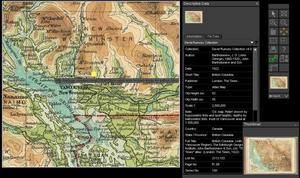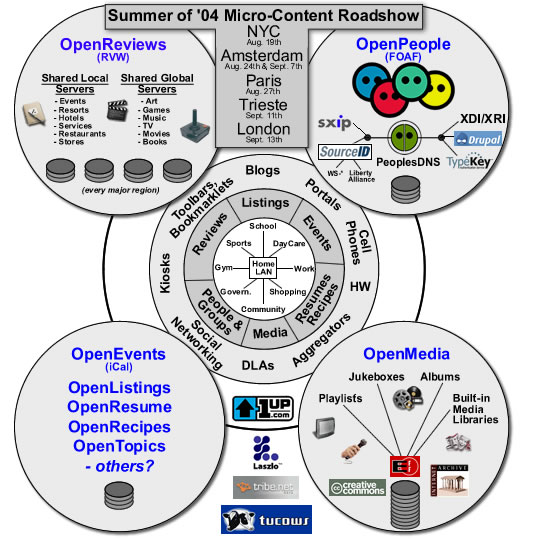| Friday, August 6, 2004 |
| Open Maps |
Jon Udell quoting Alan Durning:Play back the last 10,000 years sped up, so that a millenium passes by every minute. For more than seven minutes, the screen displays what looks like a still photograph -- the blue planet Earth, its lands swathed in a mantle of trees. After seven and a half minutes, there's a tiny clearing of forest around Athens. This is the flowering of classical Greece. Little else changes. At nine minutes -- 1,000 years ago -- the forest gets thinner in parts of Europe, Central America, China and India. Twelve seconds from the end, two centuries ago, the thinning spreads a little farther in Europe and China. Six seconds from the end, eastern North America is deforested. This is the Industrial Revolution.And of course, in the last 3 seconds things get to look really alarming.  Anyway, Jon talks about David Rumsey, a philanthropist who collects historical maps, scans them at high resolution, and makes them freely viewable on the Internet. He gave a speech at an open source conference. He says: Anyway, Jon talks about David Rumsey, a philanthropist who collects historical maps, scans them at high resolution, and makes them freely viewable on the Internet. He gave a speech at an open source conference. He says:I thought about donating it to a university, but their libraries focus on preservation, they'd have put my collection in a vault and there would have been no access. Along comes the Internet, and I found we could do even more with the digital content than with the originals. We serve over 7000 visitors a day. A typical map library will serve 200 visitors a year.Historical maps, who cares about that? Well, he's apparently put a lot of work into providing some very impressive high tech tools for exploring them. One can sequence maps for different time periods, to see how things change. One can overlay maps on each each other, including overlaying old maps on modern 3D elevation maps, and you can then take a virtual flythru through an old map. Maps are a good thing when they help us see the world and our history more clearly. Which they do much better in online interactive form than as paper in the basement of a university. [ Knowledge | 2004-08-06 09:42 | 4 comments | PermaLink ] More > |
| Microcontent Roadshow |
Marc Canter is going on a road trip. Well, I probably wouldn't have mentioned it if it wasn't for the t-shirt. A cool mind-map kind of thing on all things open and connected on the net, which Marc is a champion for.

Hey, I love it. Specific info here. [ Information | 2004-08-06 09:45 | 1 comment | PermaLink ] More > |
| Craigslist |
I might have accidentally looked at it once before, but didn't pay any attention before this article on CNN. Craigslist is a simple and funky looking site with classified adds. Started off in 1995 by one guy, Craig, sending out a daily e-mail with a jumbled collection of different items offered or sought. And then it gradually grew to something more, and that site, and a more organized, but still funky looking collection of stuff. OK, as I said, I didn't really pay any attention to craigslist, but my daughter, sitting next to me right now instantly recognizes the page and says:"Oh, craigslist? You can find everything on craigslist. Everything."And she goes on with a long list of things she's found there, and that other people she knows have found. Dates, photographers, free computers, etc. Most listings are free on craigslist. Sofar only some of the job ads have been charged for. But that article mentions that they're going to start charging for all the job ads. Which the writer quickly guestimates to be a $25 million a year business. And there are 14 people working there. And they're thinking about an IPO. And they have one billion pageviews per month. I mention it as a good small business success story. With a "why didn't I think of that" quality. Hey, I used to send out regular mailings in 1995 with assorted items that people offered or were looking for. And I could have made that site with both hands tied on my back. But Craig did, and stuck with it, so hats off to him. [ Information | 2004-08-06 09:47 | 4 comments | PermaLink ] More > |